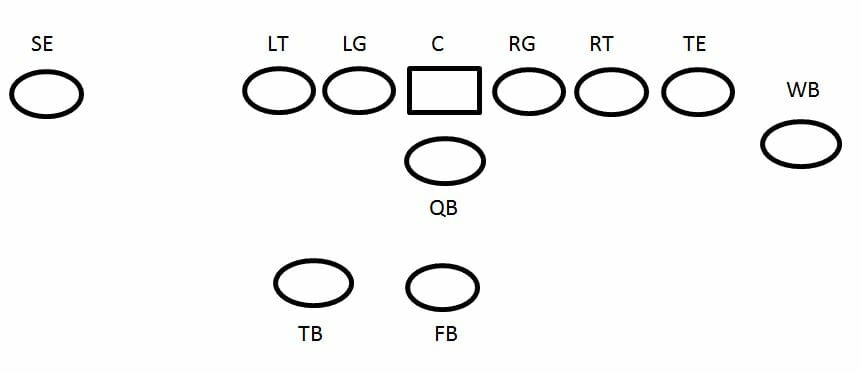From Wing-T to Air Raid, Former FCS Star Cameron Ward Makes Another Remarkable Move
LOS ANGELES — Wing-T offense is about as much of an antithesis to the air raid as one could imagine, yet the former promises to influence the latter for Washington State in the coming season.
Cameron Ward ran the Wing-T for Columbia High School in West Columbia, Texas — a town of 3,700 near the Gulf of Mexico. For those unfamiliar, a quick primer:
The offensive line (which invariably includes an end) lines up tight. The backfield features three backs, and sometimes four if the slot end lined up wide is instead used as a second tailback.
In such instances, that renders the formation a five-back offense with the wingback (hence the name) set near the tight end.
Wing-T quarterbacks (as Ward was) typically line up under center. However, if a Wing-T coordinator is feeling particularly saucy, the quarterback might line up in the Pistol. Any similarities between the Wing-T and air raid might be evident with the wingback peeling off to take a handoff or pitch, akin to the recent popularity of jet sweeps out of air-raid looks.
Air-raid offenses have evolved so much in the last two decades that “air raid” is a label about as a generic as “pro style.” There are standard principles, all of which differ dramatically from the Wing-T: offensive linemen spread out, multiple wide receivers, quarterbacks in the shotgun.
However, every iteration of the pass-happy offense has its own nuances — even from those coaches who came directly from the Mike Leach tree that popularized the scheme.
One such graduate of the Leach air-raid school is new Washington State offensive coordinator Eric Morris. After a brief flirtation with the Run-and-Shoot in the abortive Nick Rolovich era, Washington State coach Jake Dickert turned to Ward’s former Incarnate Word head coach Morris and a reintroduction of the air raid on the Palouse.
Ward and defensive end Ron Stone Jr. both smiled when asked of Morris’ take on the system, appropriately deemed “Coug Raid.”
“We add a tight end in there, go 11 personnel, 12 personnel,” Ward said. “They help us in the run game, play-action pass, take some shots. … We can run the ball when we need to.”
En route to the program’s first-ever FCS Playoffs appearance a season ago, Incarnate running backs Marcus Cooper and Kevin Brown rushed 249 combined times for 580 and 956 yards. No, Morris was most certainly not overseeing a Leach’ian air raid. But it was damn sure successful.
Morris’ spin on the offense elevated an Incarnate Word program that moved to the Football Championship Subdivision from Div. II less than a decade ago. Before Morris and Ward headed up the Cardinals, Incarnate Word’s most noteworthy football moment was perhaps providing filming locations for the 1988 football-themed teen comedy Johnny Be Good.
Unlike Anthony Michael Hall’s Johnny Walker, Cam Ward wasn’t fielding phone calls and letters from the top programs in Div. I.
Operating out of a Wing-T and thus having no opportunities to show off his arm — “we’d run bootleg five times a game” was the greatest extent to which Ward said Columbia deviated from handoffs to the backs — he wasn’t fielding interest from recruiters of any level.
“So many Power Five schools told me ‘no.’ Even D-III schools told me ‘no,’” Ward said. “Coach Morris offered me my first scholarship. I took it, and I ran with it.”
Morris’ faith paid immediate dividends, albeit with some refining before Ward debuted.
The quarterback laughed reminiscing about the steep learning curve he faced transitioning from his W-Ting background to learning the air-raid playbook. Ward said the first time he was called upon to run play-action, he released the handoff to the running back.
Force of Wing-T habit, that was.
But once he transitioned from practice, there was no indicator of uncertainty. Ward passed for 306 yards and four touchdowns in his first college game, a 48-20 rout of a Top 25-ranked McNeese bunch. The outstanding debut set the quarterback on his way to winning the Jerry Rice Award1 during the spring 2021 pandemic season in FCS.
The four touchdowns Ward tossed in his first game for Incarnate Word were half the total for which he threw his senior year at Columbia.
Three games into his tenure at UIW, Ward attempted more passes than his entire 2019 prep season. In one matchup against Nicholls as a freshman, Ward passed 65 times — more than a third of his total attempts through three years of high school.
With opportunities came production. Ward’s Rice Award-winning campaign resulted in 2,260 passing yards and 24 touchdowns against just four interceptions over a six-game season.
In 2021, Ward passed for 4,648 yards and 47 touchdowns as the Cardinals won 10 games and claimed a program-first Southland Conference championship. Remaining milestones for Ward at the FCS level were few: He’d be the overwhelming favorite to win the 2022 Walter Payton Award, the FCS Heisman, if he’d returned to Incarnate Word.
But Ward said he opted to not transfer less because he’d maxed out at Incarnate Word and more for his commitment to the one coach who saw such lofty potential in a Wing-T quarterback.
“I felt like this was the right time for me with coach Morris leaving to take that next step,” Ward said. “Taking that step, it’s the right time in my journey.”
Ward’s journey is inverse compared to most FCS-FBS quarterback transfers. His Southland Conference counterpart, Cole Kelley, won the spring 2021 season’s Walter Payton Award at Southeastern Louisiana. Kelley was originally a high-3-star recruit who landed at Arkansas after a bevy of Power Five and strong Group of Five-program offers.
Ben DiNucci, who led James Madison to an instant classic National Championship Game in the 2019 season, was a Pitt transfer. There are plenty more examples.
Cases like Ward’s are rare, and the ways it could go are divergent. He could be like Vernon Adams, the Eastern Washington standout who shined as Oregon’s immediate successor to Marcus Mariota. Ward could be Dakota Prukop, the Montana State transfer at Oregon one season after Adams who lost the starting job to Justin Herbert midway through a rough 2016 campaign.
Given how Ward transformed an air-raid offense coming from a Wing-T background already in his career, however, transitioning successfully to Power Five football should be a breeze in comparison.
The Jerry Rice Award is given to the top freshman in the Football Championship Subdivision each season.





